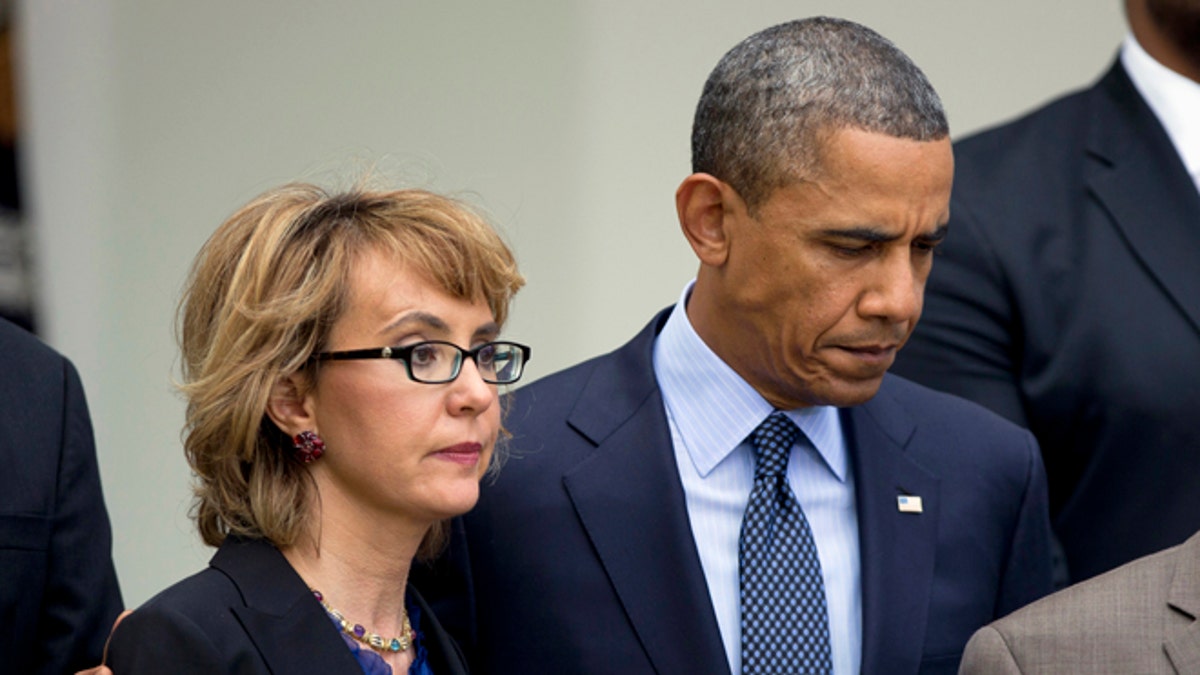
April 17, 2013: President Obama puts his arm around former Arizona Rep. Gabrielle Giffords before speaking in the Rose Garden at the White House in Washington about measures to reduce gun violence. (AP)
The Obama administration unexpectedly announced two new gun control measures on Thursday, including one that would curb the import of military surplus weapons -- in a move that could anger collectors.
Vice President Biden announced the new measures Thursday morning. The new rules, announced while Washington was otherwise focused on the crisis in Syria, took the form of executive actions, which President Obama added to the list of 23 steps the White House already determined the president could take on his own.
The steps come after Congress declined to pass any gun control legislation earlier this year despite an aggressive White House push for action in the wake of the Newton, Conn., shooting massacre. With the political world focused on Mideast tensions and looming fiscal battles, the move signaled Obama's intent to show he hasn't lost sight of the issue.
The National Rifle Association, though, ripped the administration, saying its proposals would do little to reduce crime.
"The Obama administration has once again completely missed the mark when it comes to stopping violent crime," the NRA said in a statement.
One new policy will end a government practice that lets military weapons, sold or donated by the U.S. to allies, be reimported into the U.S. by private entities. The White House said the U.S. has approved 250,000 of those guns to be reimported since 2005; under the new policy, only museums and a few other entities like the government will be eligible to reimport military-grade firearms.
The Obama administration is also proposing a federal rule to stop those who would be ineligible to pass a background check from skirting the law by registering a gun to a corporation or trust. The new rule would require people associated with those entities, like beneficiaries and trustees, to undergo the same type of fingerprint-based background checks as individuals if they want to register guns.
But the NRA said that neither measure would reduce crime, since neither the re-importation of firearms nor the corporate gun registration is known to be a source of weapons for criminals.
"Requiring background checks for corporations and trusts does not keep firearms out of the hands of criminals. Prohibiting the re-importation of firearms into the U.S. that were manufactured 50 or more years ago does not keep firearms out of the hands of criminals. This administration should get serious about prosecuting violent criminals who misuse guns and stop focusing its efforts on law-abiding gun owners," the NRA said in a statement.
The types of surplus weapons that have been re-imported under this provision are all more than 50 years old, and fall under the definition of "curio" or "relic" firearms. They include M1 Garand rifles and several other models -- a list can be found here. As such, it is safe to assume that few are used in crimes.
The event in the Roosevelt Room where Biden spoke also marked the ceremonial swearing-in for Todd Jones, whose confirmation to head the Bureau of Alcohol, Tobacco, Firearms and Explosives after six years of political wrangling to fill that position was another of Obama's post-Newtown priorities. A Senate deal to approve the president's pending nominations after Democrats threatened to change Senate rules cleared the way for Jones' confirmation last month.
Still out of reach for Obama were the steps that gun control advocates and the administration's own review say could most effectively combat gun violence in the U.S., like an assault weapons ban and fewer exceptions for background checks for individual sales. Only Congress can act on those fronts.
Although Obama and Biden have said the fight is not over, there is scant evidence that there is more support for gun control legislation than there was in April, when efforts died in the Senate amid staunch opposition from the National Rifle Association and most Republican senators.
"Sooner or later, we are going to get this right," Obama said that day in the White House Rose Garden, with the families of Newtown victims and former Rep. Gabrielle Giffords -- herself a victim of a gunman -- at his side. "The memories of these children demand it, and so do the American people," the president said at the time.
In the months following the Senate vote, Biden has claimed that a handful of lawmakers who opposed expanded background checks have told him privately they've changed their minds and want another chance. But Biden and White House officials have not named any of those lawmakers.
These days, Obama mentions gun control with far less regularity than when it appeared the Senate was poised to take action, although Obama did meet Tuesday with 18 city mayors to discuss ways to contain youth violence. And with immigration and pressing fiscal issues dominating Congress' agenda, the prospects for reviving gun legislation appear negligible. With Jones' confirmation at ATF, the White House has completed or made significant progress on all but one of the 23 executive actions Obama had previously ordered in January, the White House said. Still lingering is an effort to finalize regulations to require insurers to cover mental health at parity with medical benefits, although the White House said that it is committed to making that happen by the end of 2013.
The new rules for guns registered to corporations will follow the traditional regulatory process, with a 90-day comment period before ATF reviews suggestions and finalizes the rule. Last year, ATF received 39,000 requests to register guns to corporations and trusts.
The Associated Press contributed to this report.




